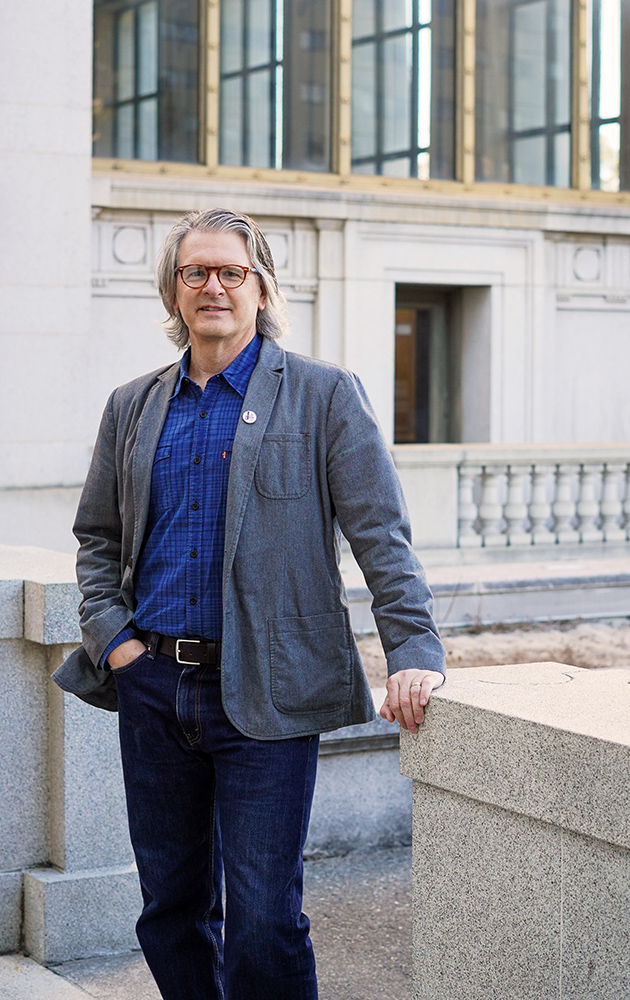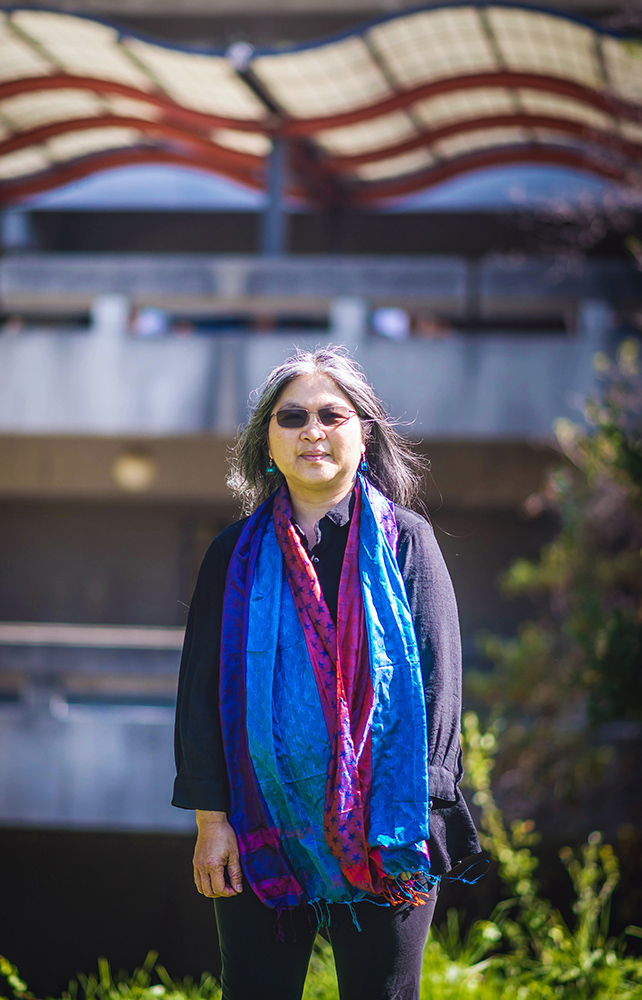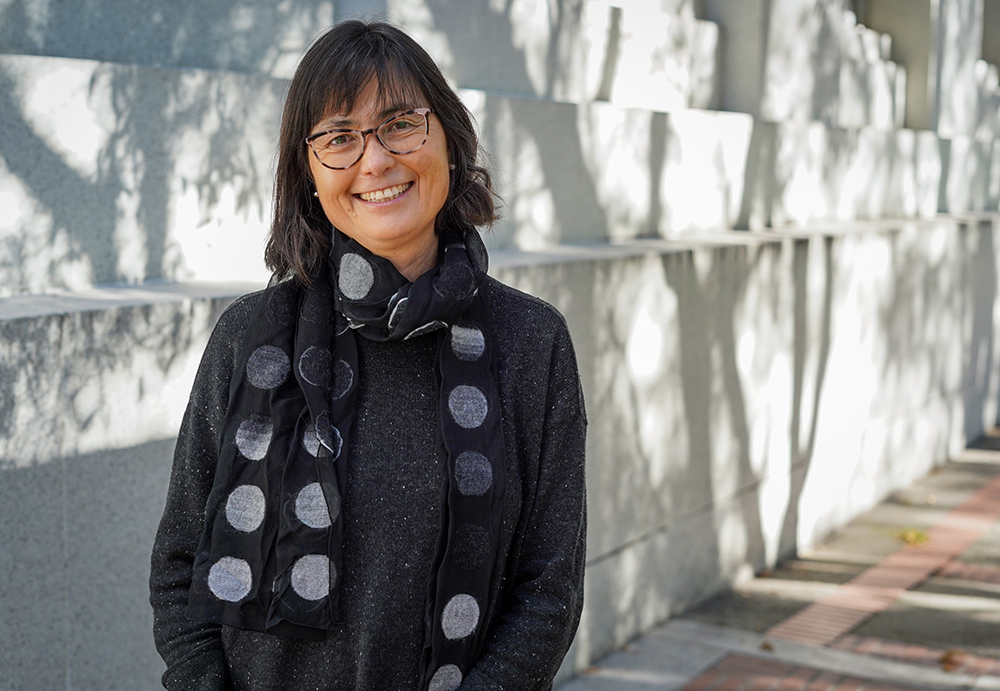Call it a full-circle moment.
In the fall of 1989, Randal Brandt, Corliss Lee, and Margaret Phillips were entering library school at Berkeley. In October, the Loma Prieta earthquake rocked the Bay Area.
When it hit, Lee and Phillips were each taking BART — Lee heading to a Special Libraries Association meeting and Phillips on her way home to San Francisco. Meanwhile, Brandt was in Doe Library’s North Reading Room, where people were plastering themselves against the wall, taking cover under tables, and, when the shaking subsided, going right back to work — that is, before a librarian asked them to leave. (“It was quite a wild ride,” he says.)
Fast-forward 31 years, and much has changed. For starters, UC Berkeley’s School of Library and Information Studies — which Brandt, Lee, and Phillips attended together — is now the School of Information (aka the I School). The digital revolution has continued to shape the way information is shared and discovered. And the world is now grappling with another crisis: the COVID-19 pandemic.
2020 Distinguished Librarian Award ceremony
Where: Zoom (registration required)
When: Dec. 10, 4-6 p.m.
Speakers: University Librarian Jeffrey MacKie-Mason,
Chancellor Carol T. Christ, LAUC-B Chair Ramona C. Collins, and more
But some things haven’t changed. The UC Berkeley Library’s role as a beacon of knowledge for the world hasn’t flickered, owing to the work of passionate, driven staff members who carry out the Library’s mission each day.
Exemplifying the highest standards of librarianship at Berkeley, Brandt, Lee, and Phillips have each been honored with the Distinguished Librarian Award this year. The biennial accolade — funded and presented by the Librarians Association of the University of California’s Berkeley chapter, with honorees selected by a committee of peers and faculty members — recognizes “excellence in librarianship” and a commitment to fulfilling the missions of teaching and research at Berkeley.
We caught up with Brandt, Lee, and Phillips (all via email) to talk about their careers, what motivates them, and what they do to unwind (which includes some “extreme sports”).
Randal Brandt
Head of cataloging and curator of the California Detective Fiction Collection at The Bancroft Library

What do you like most about your job?
The Bancroft Library’s collections are so diverse. I always say that I have never yet been bored at work. I can work on a book published in the 16th century, catalog a pamphlet printed during the French Revolution, do research on the writer of a Gold Rush diary, describe a unique artist’s book, and add Michael Connelly’s latest thriller to the collection — sometimes all in the same day. And I get to work with the best colleagues anyone could ask for.
What drives or motivates you in your work?
The Bancroft Library has a reputation for accurate, high-level cataloging. I hold myself to an exacting standard for quality cataloging, and Bancroft’s cataloging team consistently meets this standard, as well.
What is your proudest accomplishment at the Library?
I started at Bancroft in 2001. Sometime during my first year, I had a conversation with Rare Books Curator Tony Bliss about rare book cataloging. He told me not to waste my time with detailed rare book cataloging practices and standards. No researcher interested in rare books, he said, would take anything they saw in a catalog record at face value. They would call him to check, double-check, and verify anyway, so why bother spending the extra time on cataloging? I really respected and admired Tony, but this is one bit of his advice that I chose to ignore.
By the time of his retirement in 2012, Tony had told me numerous times how much he appreciated having this detailed, accurate, and reliable information in the catalog records, and that he could now tell researchers that they could believe what they found in the catalog records!
What do you like to do for fun outside of work? Or is there a fact about you that people might be surprised to know?
Although my job title includes curator of the California Detective Fiction Collection, I have a secret passion for Nordic noir — crime novels set in Scandinavian countries and Iceland. And, although I’m certainly no expert, I had the privilege of moderating the Nordic noir panels at the Bay Area Book Festival in 2018 and 2019, where I got to meet and hang out with some of my favorite authors in the genre.
How does it feel to be honored with a Distinguished Librarian Award?
It is a truly humbling experience to be honored with a Distinguished Librarian Award. I am extremely proud to represent both catalogers and The Bancroft Library with this award.
Can you talk about your approach to cataloging rare materials, and your eagerness to pass on your knowledge through the California Rare Book School and other venues?
The primary objectives of rare book cataloging are no different in purposes or aims from any other type of library cataloging. The goal of library cataloging is to help users find, identify, select, and obtain appropriate library resources. However, users of rare materials often bring specialized requirements to these tasks that cannot be met by general cataloging rules. So in rare materials cataloging, a much greater emphasis is placed on describing the physical object, from the way in which the book was printed, and by whom, to the material used in the binding. The ownership history of any individual copy of a work is also routinely described and traced in a rare materials catalog record.
One of the highlights of my year is the week that I get to spend each August diving into these ideas and concepts with diverse groups of students who are eager to learn the mysteries of rare book cataloging at California Rare Book School. I find that I learn something new every time I teach the class.
Can you talk about The Bancroft Library’s California Detective Fiction Collection? How has it changed and grown over the years, and what are some of the prized volumes it contains?
Before the official establishment of the California Detective Fiction Collection in 2013, The Bancroft Library had a significant collection of mystery and detective fiction set in San Francisco and the Bay Area. Since 2013, the collection has expanded to include a wider geographic scope, particularly with books set in Southern California, but also in less typical settings like Lake Tahoe, the Sacramento area, the Central Coast, and the San Joaquin Valley. The collection also includes books by California authors even if the stories are not set in California. Some of the collection highlights include first editions by the so-called holy trinity of hard-boiled crime fiction, Dashiell Hammett, Raymond Chandler, and Ross Macdonald. A recent acquisition of nearly 400 volumes of books by Erle Stanley Gardner just might give Bancroft the single largest collection of the creator of Perry Mason.
Corliss Lee
Liaison to American Cultures, American studies, ethnic studies, and College Writing

What do you like most about your job?
It’s a tie between the students and my colleagues.
What drives or motivates you as a librarian?
We live in an Information Age, and everyone should have the ability to access and evaluate information. Helping students grow and learn is the best job in the world.
What is your proudest accomplishment at the Library?
Still ahead of me …
What do you like to do for fun outside of work?
All the extreme sports: reading, movies, plays, museums, and walks.
How does it feel to be honored with a Distinguished Librarian Award?
“I shall study deserving.”1
Or: “Not worthy!”2
Colleagues have applauded your leadership when it comes to shining a light on the important topics of equity, inclusion, and belonging. How are these themes woven into your work?
I try (and sometimes succeed) in weaving these themes into every project — teaching, helping students and faculty with research, creating instructional objects and exhibits, outreach to campus groups, and so on.
I’ve been fortunate to work for most of my career with the American Cultures Center, which sponsors an array of creative projects that support teaching, curriculum development, community engagement, and student research. Alongside Margaret I’ve been involved with the Art+ Feminism+Race+Justice Wikipedia Edit-a-Thon (2021 info coming soon!) and the 19th Amendment online exhibit. I have done many small exhibits coordinated with the theme of the campus On the Same Page program, which is often equity-focused; I also was on the committee that created an exhibit on the Third World Liberation Front (accompanying Library Guide here). When the faculty adviser to the San Quentin News, William Drummond, was looking for a way to digitally archive the newspaper (which is made by people who are incarcerated at San Quentin State Prison), I helped him work with the Library’s IT department, which has now scanned recent issues of the newspaper for posterity. Other recent projects have been more librarian-focused: a 2019 conference on social justice and critical librarianship and speaking at a librarian forum on news literacy and fake news.
Libraries facilitate access to information for millions of people who might not otherwise have access to the internet, library databases, books, videos, technology, and much more. But they are also part of the structures that have reinforced structural racism, and our own overly complicated organizational structures hinder access. We have a lot of work to do if we want to truly facilitate access to information for all.
___________________________
1 King Lear, although spoken by a villain
2 Wayne and Garth
Margaret Phillips
Librarian for education, gender and women’s studies, and psychology

What do you like most about your job?
Helping students.
What drives or motivates you as a librarian?
I love my job. It is rewarding to work with students and satisfying to build collections in support of the departments I serve. I am proud to work for the University of California and to be an active contributor to its educational mission. My motivation stems from the fact that I love what I do, and, keeping the big picture in mind, I don’t even mind doing the mundane tasks that are part of any job.
What is your proudest accomplishment at the Library?
Over the years, there have been so many opportunities to be proud of my work. Recently, I’ve worked on a number of public exhibits including Birds Do It, Bees Do It: A Century of Sex (Mis)Education in the USA; We’re Here, We’re Queer, and We’re in the Public Record!: The LGBTQ Movement and Life as Seen through Government Information; and, this fall, an online exhibit called The Nineteenth Amendment: The Fight for Women’s Suffrage. Through these exhibits, we tried to tell an important story and engage a wide audience with our collections. I’ve learned so much while working on them. Plus, I always enjoy collaborating with colleagues.
Is there a fact about you that people might be surprised to know?
I’m a “Foreign Service brat” and had the great privilege of spending my preteen years in countries like the Philippines, Mexico, New Zealand, and India. I’d like to think that my early exposure to other cultures helped me become more open-minded and empathetic.
How does it feel to be honored with a Distinguished Librarian Award?
What is particularly meaningful about the Distinguished Librarian Award is that it is awarded by my peers. The Librarians Association of the University of California (LAUC) are fellow librarians, and the nomination itself was submitted by colleagues. Also, I am honored to be in the company of so many distinguished librarians of the past and to share this award with Corliss and Randy.
Colleagues have commended you on your leadership in the area of open access. Can you talk about your work in that space?
I like to joke that I was into open access before it was cool — I realized early on how important it is for the public to have access to our scholars’ research. I helped plan a conference on scholarly publishing back in 1998. Since then I’ve served on committees, given presentations, and written papers on scholarly communication topics, all with the goal of educating my peers and the community about open access. I also coordinate the Berkeley Research Impact Initiative (BRII), the Library-sponsored fund that subsidizes Berkeley authors to make their publications free to all readers — which has now funded almost 500 articles.
You have also been lauded for your focus on social justice. How does the topic of social justice intersect with your work as a librarian?
As a selector and liaison for education and gender and women’s studies, I serve departments that examine and challenge existing power structures and that are committed to social justice. This means that my work as a librarian, whether making decisions about our collection or working with researchers, intersects directly with social justice. Social justice is also a focus of much of the programming I’ve been involved in over the years including the Art+Feminism+Race+Justice Wikipedia Edit-a-Thons, an annual event designed to close the racial and gender gap in Wikipedia content, and the Free Speech Movement Café educational programs. One recent program I helped organize highlighted the Berkeley Underground Scholars, a grassroots program for Berkeley students directly impacted by the prison-industrial complex. I’m also active in the University Council-American Federation of Teachers (UC-AFT), the union representing UC librarians and lecturers, helping to advocate for good wages and working conditions not just for librarians, but all UC workers.